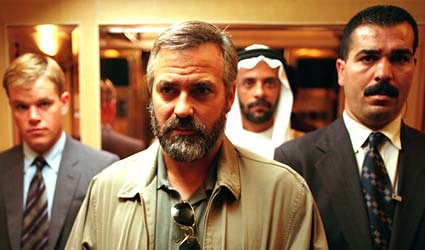NOTE: There may be minor spoilers. You've been warned.

starring: George Clooney, Matt Damon, Jeffrey Wright, and Alexander Siddig
written by: Stephen Gaghan, from the book by Robert Baer
directed by: Stephen Gaghan
R, 126 min, 2005, USA
From Stephen Gaghan, the man who brought us
Traffic (2000)[1], comes a similar investigation of the Middle East and it's monopoly over the petroleum industry. In a complex plot that takes us from Washington D.C. to Geneva to Iran, Gaghan reveals a multi-faceted look at a rare business that starts wars and controls the fates of nations.
The United States, it will suprise no one to learn, consumes the vast majority of the fossil fuels in the world, yet it produces only a small portion. So it is up to the government and business sectors to invent creative, if not entirely ethical, means by which to procure the amount needed. And within the framework of the law. Or, at least it needs to appear that way. So it is up to lawyers like Bennett Holiday (Jeffrey Wright) to cover the trails of men who use corruption as a means of doing business. He is charged with the task of outmaneuvering a government investigation that is holding up a potential merger, while giving the impression that he is performing "due dilligence" of the law. It is a high-wire act of sorts for Holiday, who must uncover the crimes of his clients before the government uncovers them first, meanwhile maintaining their trust and his own innocence.
In Geneva, Bryan Woodman (Matt Damon) must negotiate deals with the Prince of Iran (Alexander Siddig) while mourning the death of his son. Such is a common theme of the film--most of the characters are shown dealing with life in two arenas. There is the obvious one of their work lives. They must negotiate and investigate and plot and scheme, but at the same time there is a personal conflict that motivates their dealings (or at very least influences them). Woodman is the prime example. He takes his family to a party at the palace of an oil-rich royalty where his son is accidentally electrocuted in the pool. In the midst of the mourning, he must negotiate with this same royalty. When he is awarded a contract, he tersly replies, "How much for my other son?" It is a compelling exchange, as Woodman attempts to maintain a bit of professionalism. In the end, though, he takes the deal and it has negative consequences on his marriage. Because in a film like
Syriana everything that happens affects everything else, either in directly or through some sort of ripple effect. However, Gaghan is smart enough to not employ a "butterfly effect" worldview[2], but lets it happen organically. So Woodman's dealings with the Prince are set in motion by the corporate merger Holiday is trying to help get pushed through and directly influenced by Robert Barnes (George Clooney), a CIA operative sent to have the Prince assasinated. Naturally, none of them see all these strings that tie them together.
The one thing Gaghan does so well, perhaps better than anyone currently working in the film industry, is to seamlessly insert his stories and characters into a world we see on the news everyday. A knowledgeable film buff will recognize many of the main characters (i.e. Clooney, Damon, Chris Cooper, etc.), but he fills a large number of the speaking roles with unknowns who may or may not be actors[3] and have a look of authenticity that lends a great deal of credibility to the film at large. He combines this with a carefully researched, nuanced script that certainly feels as if he's mixed movie stars into real locales with real Iranian princes and businessmen and CIA operatives. Much of this has to do with the actors (real or not) who manage to pull off the difficult task of naturalism. That is, none of them seem to be acting. Rather we get the feel of a documentary that just happens to have George Clooney and Matt Damon in it.
Syriana is the type of film that is too complex to fully digest initially; it's the type of film that your mind comes back to for hours after you've seen it. It has a labrynth quality that borders on confusion, but when viewed with a bit of distance feels like a jigsaw puzzle of a cubist painting. Perhaps not all of the parts seem to fit, but when viewed as a collective whole, it really takes shape. I imagine it gets better with repeated viewings. This is a film that has the potential to outlast its subject matter, or at least our dependence on it.
**************
[1] He did not direct
Traffic--Steven Soderberg did--but he wrote the screenplay that earned him an Academy Award.
[2] The theory being that a butterfly flapping its wings can change the weather half-way around the globe. You see this quite often in French films, and more recently a very bad Ashton Kutcher movie.
[3] I have no idea if they are and no desire to find out, lest it tarnish the experience.